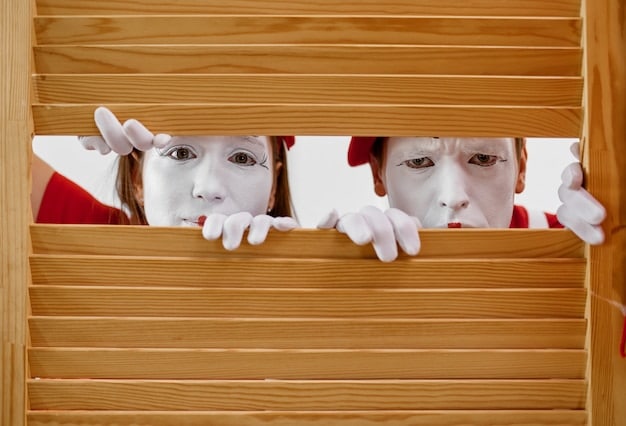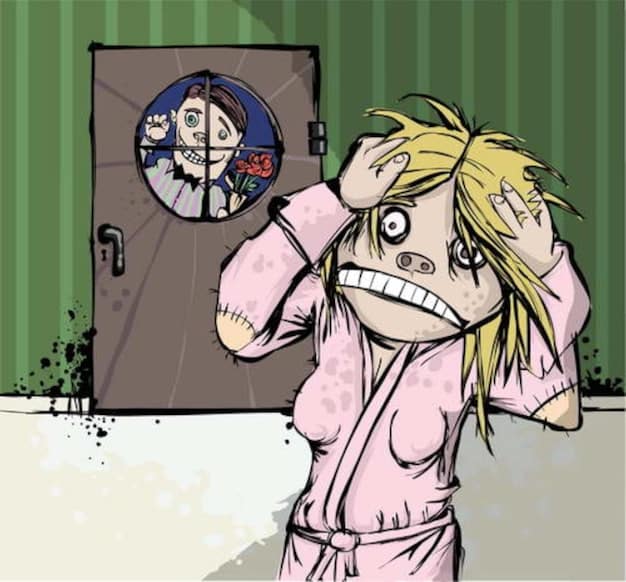Lost in Translation: Decoding Japanese Humor in Dramas for US Viewers

Lost in Translation? Understanding Japanese Humor and Cultural Nuances in Dramas for US Viewers explores the unique comedic elements found in Japanese dramas (dramas), offering insights for American viewers to better appreciate and navigate the cultural differences that shape the humor.
Japanese dramas, or dramas, have captivated audiences worldwide, including in the United States. However, a significant barrier to full enjoyment can be the cultural nuances embedded within the humor. This article, Lost in Translation? Understanding Japanese Humor and Cultural Nuances in Dramas for US Viewers, can help you navigate these comedic subtleties.
Unraveling Japanese Humor in Dramas: A Cultural Dive
Japanese humor, much like any other culture’s comedic sensibilities, is deeply rooted in its history, social norms, and values. Understanding these foundations is crucial for American viewers to fully appreciate the comedy presented in dramas. Let’s begin exploring this cultural landscape.
The humor often revolves around everyday situations, social interactions, and character quirks that might seem ordinary on the surface but carry a deeper cultural resonance. It’s a blend of performance, storytelling, and context, making it essential to understanding the nuances of Japanese comedy.
The Importance of Context in Japanese Comedy
Context plays a vital role in understanding Japanese humor. What might seem like a simple situation or joke can often have layers of meaning that are only revealed through understanding the social context. This includes understanding the relationship between characters, their social standing, and the overall situation.
This section will cover various elements within Japanese culture that specifically shape its comedic elements.
* **Social Hierarchy:** Japan has a well-defined social hierarchy. Humor often arises from the interplay between individuals of different social statuses, like jokes about a subordinate’s relationship to their boss.
* **Indirect Communication:** The Japanese often prefer a polite indirect style in communications. This is also reflected in Japanese humor where a lot is implied and not directly spoken out.
* **Cultural References:** Many jokes rely on the audience’s familiarity with Japanese culture, history, and folklore. Without this background knowledge, a joke might simply fall flat.
Common Themes in Japanese Drama Humor
* Misunderstandings arising from cultural differences
* Slapstick comedy and over-the-top exaggerations
* Self-deprecating humor and poking fun at one’s own flaws
* Situational irony and unexpected twists of fate
Japanese TV shows such as “Gaki no Tsukai” and “Downtown Abbey” are very successful in the country and abroad. It is important to understand the context to fully digest the references.

Types of Japanese Humor Commonly Seen in Dramas
Japanese dramas showcase a diverse range of comedic styles, each with its unique appeal. From slapstick and physical antics to witty banter and clever wordplay, the types of humor found in dramas are often nuanced and require a deep understanding of Japanese culture and social dynamics to fully appreciate them. It’s also important to understand the key types of humor used in various dramas you watch.
Understanding these different formats can significantly enhance your viewing experience.
Manzai: The Art of Stand-Up Comedy
Manzai is a traditional form of Japanese stand-up which features two comedians: the *boke* (idiot) and the *tsukkomi* (straight man). The *boke* makes absurd statements or actions, while the *tsukkomi* corrects or berates them with witty remarks and sharp observations. A lot of the humor in Manzai derives from the interaction between the *boke* and the *tsukkomi*.
Slapstick and Physical Humor
Slapstick is very popular and seen in multiple series. Many Japanese dramas employ slapstick comedy and physical humor to create laughter. This type of humor relies on exaggerated physical actions, pratfalls, and over-the-top reactions to elicit amusement. Viewers can see this in exaggerated stumbles, overly dramatic gestures, and comical facial expressions.
Wordplay and Pun-Based Humor
Wordplay and puns are common in Japanese humor, as Japan has many homophones (words that sounds the same but have different meanings). This type of humor involves playing with words’ sounds or meanings to create jokes. This is very difficult to translate and is normally cut of shows imported.
This is normally replaced with a more understandable joke.
Cultural Nuances That Influence Japanese Humor
To truly appreciate Japanese humor in dramas, it’s valuable to understand the cultural values that underpin it. Several key aspects of Japanese society shape their humor. Ignoring these can lead to misunderstandings and missed comedic opportunities.
The culture is a product of many aspects, such as the country’s history, traditions, social norms, and values.
The Concept of “Face” (Mentosu)
“Face,” or *mentosu*, is essential in Japanese society. It refers to an individual’s reputation, honor, and social standing. Humor often arises from situations where someone loses “face” or attempts to save it. Making fun of someone else, with the exception of close friends, is looked down upon.
Group Harmony and Conformity
Japan has a strong emphasis on group harmony and conformity. Humor often targets individuals who deviate from social norms or disrupt group cohesion. It is typically displayed in the series as someone being out of touch.
Here are several examples of Japanese cultural norms:
* Respect for elders and authority figures
* Politeness is valued by those in power
* Emphasis on group harmony and cooperation
* Avoiding conflict and confrontation
* Humility
* Awareness of social hierarchy
Self-Deprecating Humor as a Virtue
In many western countries self deprecating humor is seen like this person has no confidence and is insecure. Japanese humor is a virtue, showcasing humility and a willingness to laugh at oneself. It is much more accepted in dramas and is considered a good personality trait.

The Role of Language in Japanese Comedy
The Japanese language itself plays a significant role in shaping its humor. Certain linguistic features and nuances contribute to the comedic effect in dramas. Language is the tool comedians use to deliver jokes.
The language allows for things such as puns to be written.
Without it, the jokes simply do not hit the same.
Honorifics and Politeness Levels
Japanese has a complex system of honorifics and levels of politeness. The way someone speaks indicates their social standing and relationship with the person they’re addressing. So it is also very important in Japanese humor.
* **Formal language (keigo):** Used in formal settings, such as business meetings or when speaking to superiors.
* **Polite language (teineigo):** Used in everyday conversation with people you don’t know well or those who are older than you.
* **Plain language (futsūgo):** Used with close friends and family.
Dialects and Accents
The region someone is from often affects the way they speak. Each dialect can be easily targeted by comedians for a joke. These type of jokes are called dialect jokes.
* **Osaka dialect (Osaka-ben):** Known for its bluntness and humor.
* **Kyoto dialect (Kyoto-ben):** Known for its politeness.
* **Tokyo dialect (Tokyo-ben):** Considered the standard dialect of Japan.
Sound Symbolism and Onomatopoeia
Japanese has a rich collection of onomatopoeia (words that imitate sounds) and sound symbolism (words with inherent sounds that evoke certain meanings). For comedic effect sounds of things, like when someone is hit or something falls over, are usually exaggerated.
* *Wan-wan*: The sound a dog makes in Japanese.
* *Pika-pika*: Sparkling or glittering.
* *Goro-goro*: Rumbling sound.
Navigating “Lost in Translation” Moments
When watching Japanese dramas, American viewers will likely encounter moments where the humor seems “lost in translation.” This is often due to a combination of cultural differences, linguistic nuances, and unfamiliar comedic conventions. However, if someone wants to understand Japanese culture, it will require extensive studies of the history of the culture.
Studying Japanese culture is the best way to start figuring out the jokes. Let’s dive into how one could begin to appreciate the culture to comprehend the jokes.
Research Cultural Context
Before diving into a drama, take time to learn about the cultural context in which it is set. This might involve researching Japanese history, social customs, and values.
Some things to investigate:
* Japanese history, social customs, and values
* Common Japanese idioms and expressions
* Traditional Japanese art forms like kabuki and rakugo
Consult Online Resources and Communities
There are many online forums, communities, and fan sites dedicated to Japanese dramas. These communities can also help you understand Japanese Culture.
Tips on how to consult this material:
* Read online forums dedicated to Japanese dramas.
* Read blogs and articles that explain Japanese culture
* Watch video explanations on Japanese comedy.
Embrace Cultural Differences
The most important thing in getting the nuances of the jokes is to embrace that Japanese and American humor are inherently different. Be ready to watch something you don’t fully grasp or understand. You may even be enlightened about the culture.
Tips for Appreciating Japanese Humor in Dramas
Embrace cultural differences and be prepared to encounter humor that differs from Western-style comedy. In Japanese comedies, the culture is very different.
What seems normal for them seems weird to others. Here are some tips.
* **Be patient:** It may take time to adjust to the different rhythm and style of Japanese humor. Keep watching, and gradually you will familiarize yourself with the idiosyncrasies of the culture.
* **Pay attention to body language:** Body language is very important in japan. Many things that people say in Japan is expressed non-verbally such as tone and movement.
* **Take notes:** Jot down notes on a notepad after a show on what jokes you don’t get, then do some research.
By taking an open-minded and curious approach, American viewers can unlock a whole new world of laughter and enjoyment by watching Japanese dramas.
| Key Point | Brief Description |
|---|---|
| 😂Cultural Context | Understanding Japanese culture is vital for grasping humor. |
| 🗣️Linguistic Nuances | Honorifics, dialects, and onomatopoeia shape comedic deliveries. |
| 🎭Humor Styles | Manzai, slapstick, and wordplay are common comedic forms. |
| 🤝Embrace Differences | Be open-minded and embrace cultural distinctions for better understanding. |
Frequently Asked Questions (FAQs)
▼
Japanese humor is steeped in cultural context and social nuances. Aspects of formal politeness, indirectness, and wordplay contribute to its distinct style, diverging from common American humor. Cultural and historical references have very different meanings in the US and Japan.
▼
Common themes include misunderstandings arising from cultural differences, exaggerated slapstick, self-deprecating humor, and situational irony. Themes such as hierarchy and social status plays a role within the jokes.
▼
The Japanese language plays a crucial role, with the use of honorifics, dialects, and onomatopoeia shaping comedic delivery. Puns and wordplay are often included making jokes harder to translate.
▼
To understand Japanese humor and dramas, you should research cultural context and embrace cultural differences. Its essential to note that body language, tonality, and patience is the key to learn the nuisances.
▼
Japanese humor has western influences but maintains its unique identity rooted in culture. Blending both styles leads to the creation of its unique identity. The blending of the cultural makes it unique.
Conclusion
Understanding Japanese humor in dramas requires a willingness to learn about its cultural roots and linguistic nuances. By embracing these differences, viewers can unlock a new level of enjoyment and appreciation for the art of Japanese storytelling.





